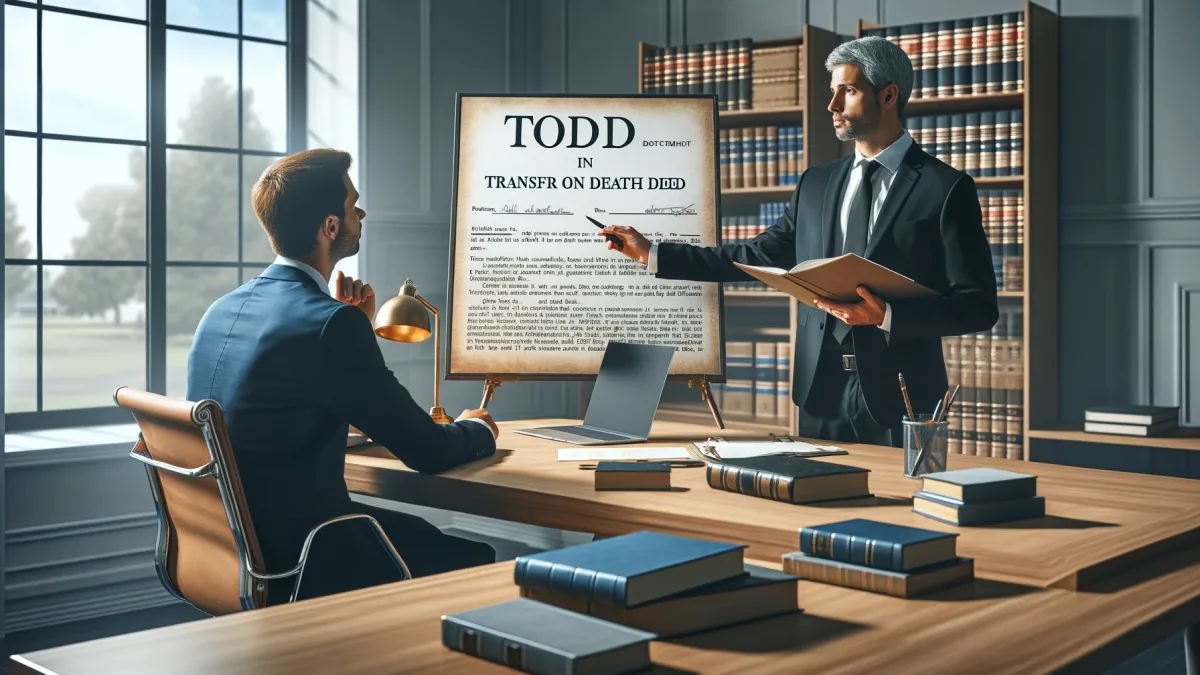Navigating the path of estate planning in California, you might encounter various tools designed to simplify the transfer of assets upon death. Among these, the “Transfer on Death Deed” (TODD) stands out for its efficiency and ease of use. But what exactly is a TODD in California, and how does it function? Let’s delve into the specifics, demystifying this estate planning instrument for Californians.
Understanding Transfer on Death Deed
A Transfer on Death Deed allows property owners in California to pass on real estate directly to a beneficiary without the need for the property to go through probate. This legal document is akin to a regular deed used to transfer property, but with a crucial distinction: it only takes effect upon the death of the property owner.
The Appeal of TOD Deed
Avoiding Probate: The primary allure of a TODD lies in its ability to bypass the probate process. Probate can be time-consuming and costly, presenting a significant burden for the heirs of an estate. By using a TODD, the property is transferred immediately to the designated beneficiary upon the owner’s death, sidestepping probate entirely.
Simplicity and Revocability: Implementing a TODD in your estate plan is straightforward. The property owner simply completes and records the deed with the county recorder’s office. Importantly, this type of deed is revocable. The property owner can change their mind at any time, revoking the deed or naming a different beneficiary without the beneficiary’s consent.
Cost-Effectiveness: Compared to other estate planning tools, such as setting up a living trust, a TODD is a cost-effective option for transferring real property. There are minimal costs involved, primarily related to drafting the deed and recording it with the county.
Key Considerations for TOD Deed
While TODDs offer clear benefits, there are several important considerations to keep in mind:
Eligible Property Types: In California, TODDs can be used for single-family homes, condominiums, and certain types of agricultural land. It’s essential to confirm that your property qualifies for transfer via a TODD.
Joint Ownership: For property owned jointly, the TODD only affects the interest of the owner who executed the deed. Upon their death, their share of the property passes to the named beneficiary, subject to the rights of any surviving owners.
Debt and Liabilities: A TODD transfers property subject to any existing debts or liabilities. Beneficiaries should be aware that they might inherit not just the property but also any associated financial obligations.
Impact on Public Benefits: Beneficiaries receiving public assistance should consider how inheriting property via a TODD might affect their eligibility for those benefits.
How to Create a TOD Deed in California
Creating a TODD involves several steps:
- Drafting the Deed: The deed must include specific language, the legal description of the property, and the beneficiary’s name.
- Notarization: Once completed, the deed must be notarized.
- Recording: Finally, the deed must be recorded with the county recorder’s office in the county where the property is located, typically within 60 days of notarization.
Revoking a TOD Deed
Revocation is as simple as the creation process. A property owner can revoke a TODD by executing a new deed that explicitly revokes the previous one, recording a different TODD naming a new beneficiary, or transferring the property outright to someone else during the owner’s lifetime.
Conclusion: A Valuable Tool with Caveats
The Transfer on Death Deed in California offers a streamlined, cost-effective way to transfer real property upon death, bypassing the probate process. However, like any estate planning tool, it’s not a one-size-fits-all solution. Property owners should consider their overall estate plan, the nature of their property, and the potential implications for their beneficiaries.
For those considering a TODD, consulting with an estate planning attorney is invaluable. An attorney can provide tailored advice, ensuring that the TODD aligns with your broader estate planning goals and offers the best protection for your beneficiaries.
In the ever-evolving landscape of estate planning, knowledge is power. Understanding the nuances of tools like the Transfer on Death Deed empowers Californians to make informed decisions, securing their legacy and providing for their loved ones with clarity and confidence.









Leave a Reply